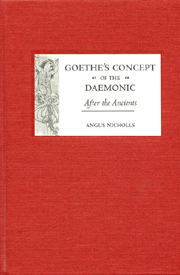Book contents
- Frontmatter
- Contents
- Editions and Abbreviations
- Acknowledgments
- Introduction
- 1 The Ancients and Their Daemons
- 2 The Daemonic in the Philosophy of the Sturm und Drang: Hamann and Herder
- 3 Romanticism and Unlimited Subjectivity: “Mahomets Gesang”
- 4 Werther: The Pathology of an Aesthetic Idea
- 5 Kantian Science and the Limits of Subjectivity
- 6 Schelling, Naturphilosophie, and “Mächtiges Überraschen”
- 7 After the Ancients: Dichtung und Wahrheit and “Urworte. Orphisch”
- 8 Eckermann, or the Daemonic and the Political
- Epilogue: Socrates and the Cicadas
- Works Cited
- Index
8 - Eckermann, or the Daemonic and the Political
Published online by Cambridge University Press: 05 February 2013
- Frontmatter
- Contents
- Editions and Abbreviations
- Acknowledgments
- Introduction
- 1 The Ancients and Their Daemons
- 2 The Daemonic in the Philosophy of the Sturm und Drang: Hamann and Herder
- 3 Romanticism and Unlimited Subjectivity: “Mahomets Gesang”
- 4 Werther: The Pathology of an Aesthetic Idea
- 5 Kantian Science and the Limits of Subjectivity
- 6 Schelling, Naturphilosophie, and “Mächtiges Überraschen”
- 7 After the Ancients: Dichtung und Wahrheit and “Urworte. Orphisch”
- 8 Eckermann, or the Daemonic and the Political
- Epilogue: Socrates and the Cicadas
- Works Cited
- Index
Summary
In Johann Peter Eckermann's Gespräche mit Goethe in den letzten Jahren seines Lebens (1835), Goethe elaborates upon his notion of the daemonic in a series of conversations, the dates of which range from 1829 right up to June 1831, less than one year before his death. The breadth and variety of these statements is simply too great to be encompassed within the confines of the present study. Hans Blumenberg observes, in relation to Goethe's use of the notion of the daemonic during the latter stages of his life, that by this time the godlike or the divine was no longer seen by Goethe as being exceptional. Thus everything that Goethe sees as being superhuman and everything that possesses “die Qualität der ‘Unerreichbarkeit’” is categorized as dämonisch (BAM, 520).
Previous attempts to encompass the notion of the daemonic in Goethe's works have often expended enormous energy on his ruminations on the subject found in Eckermann's Gespräche, only to conclude (unsurprisingly) that the concept is not unified, or that Goethe's use of the term borders upon the burlesque. At the same time, however, Blumenberg's assessment is not entirely correct, since many of Goethe's utterances on the daemonic in Eckermann's Gespräche are made in earnest and within a specific philosophical context. Indeed, some of them suggest to the reader that the daemonic is a kind of mysterious higher power in the Neo-Platonic mold, a power that, especially in the case of Napoleon — a figure about whom Goethe was not inclined to speak lightly — has the capacity to shape history.
- Type
- Chapter
- Information
- Goethe's Concept of the DaemonicAfter the Ancients, pp. 248 - 262Publisher: Boydell & BrewerPrint publication year: 2006

